NCERT Solutions for Class 12 Maths Chapter 6 - Application of Derivatives - Exercise 6.4
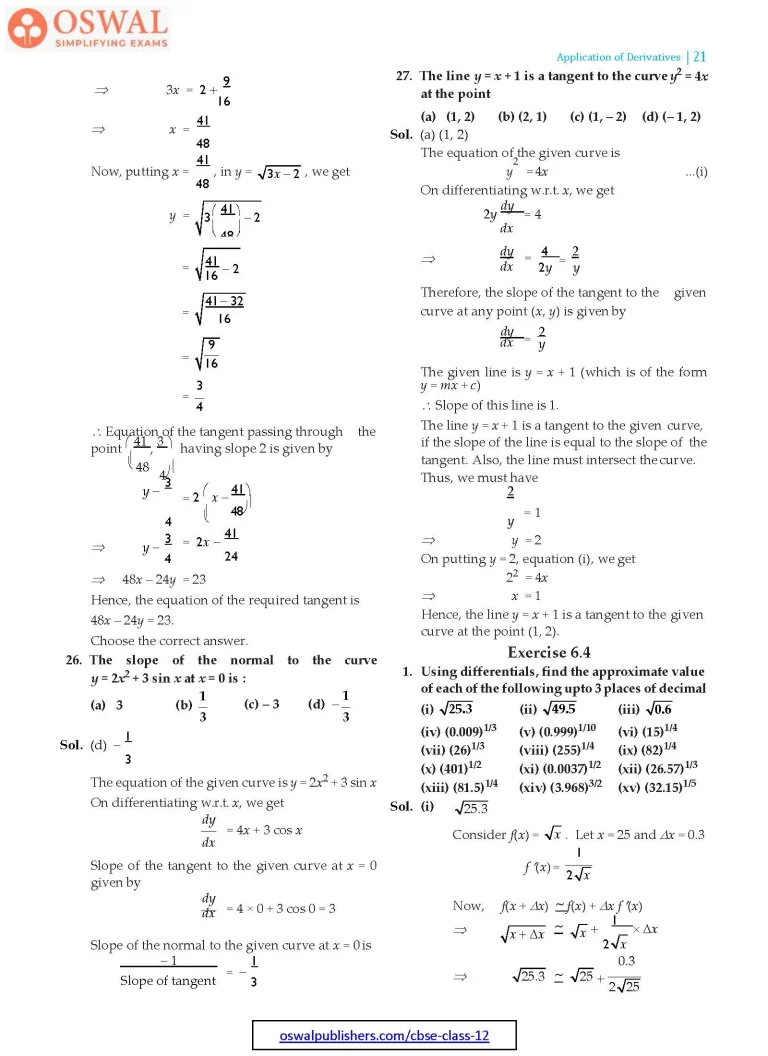
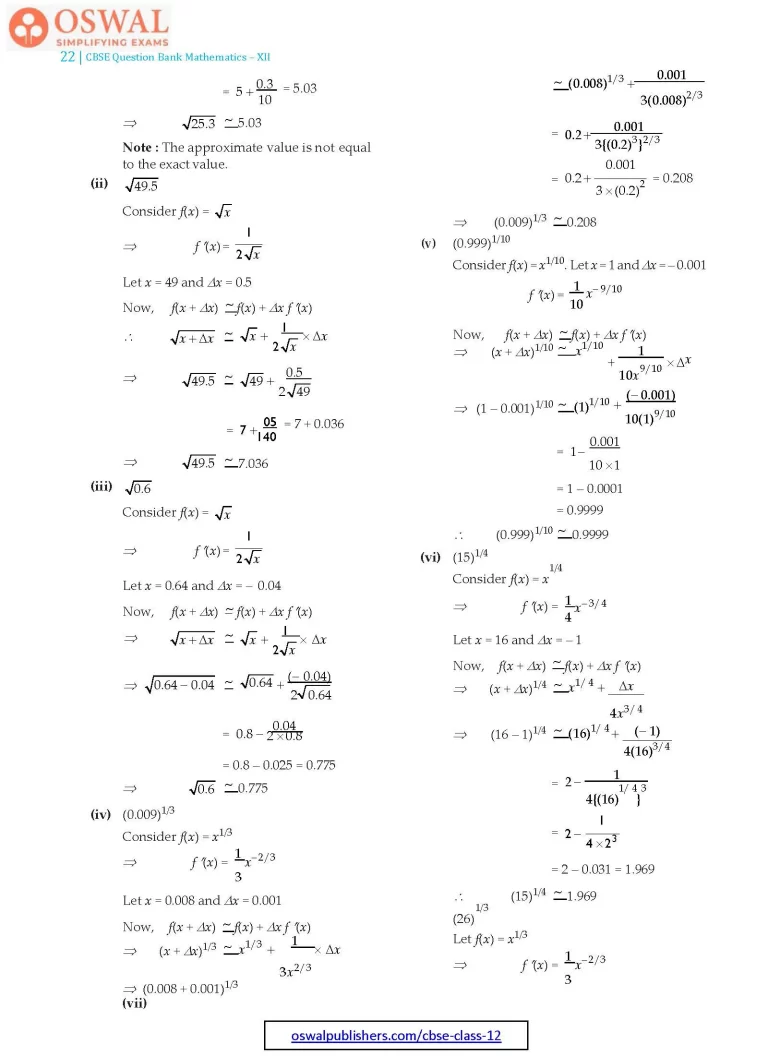
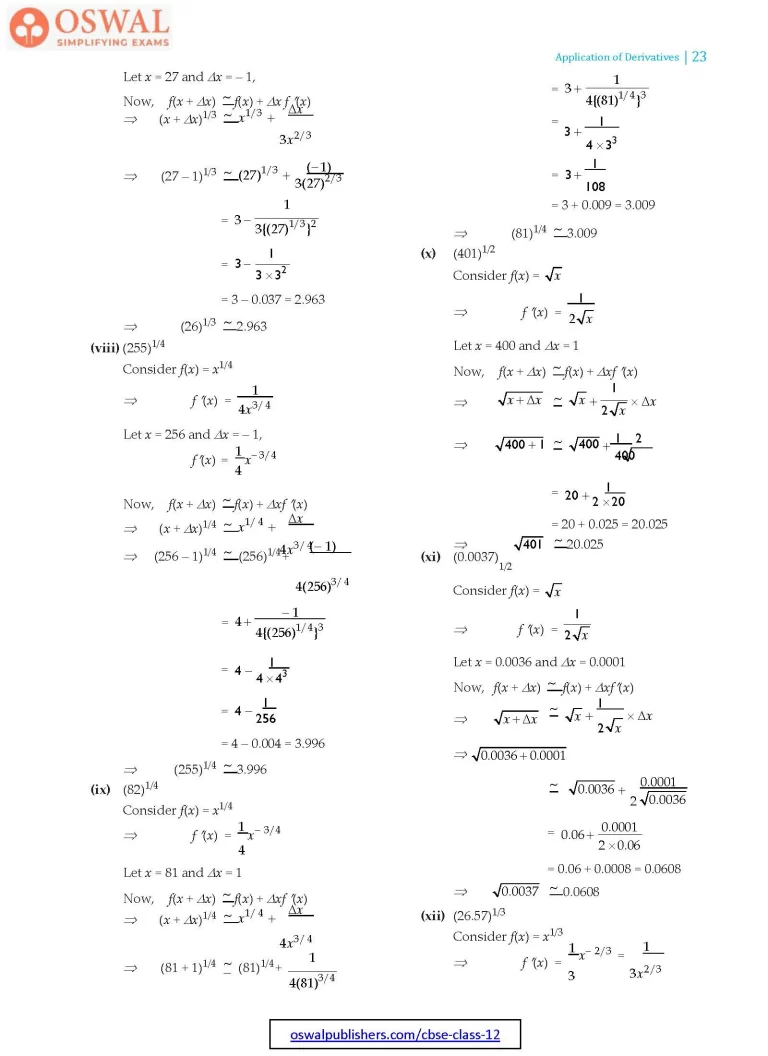
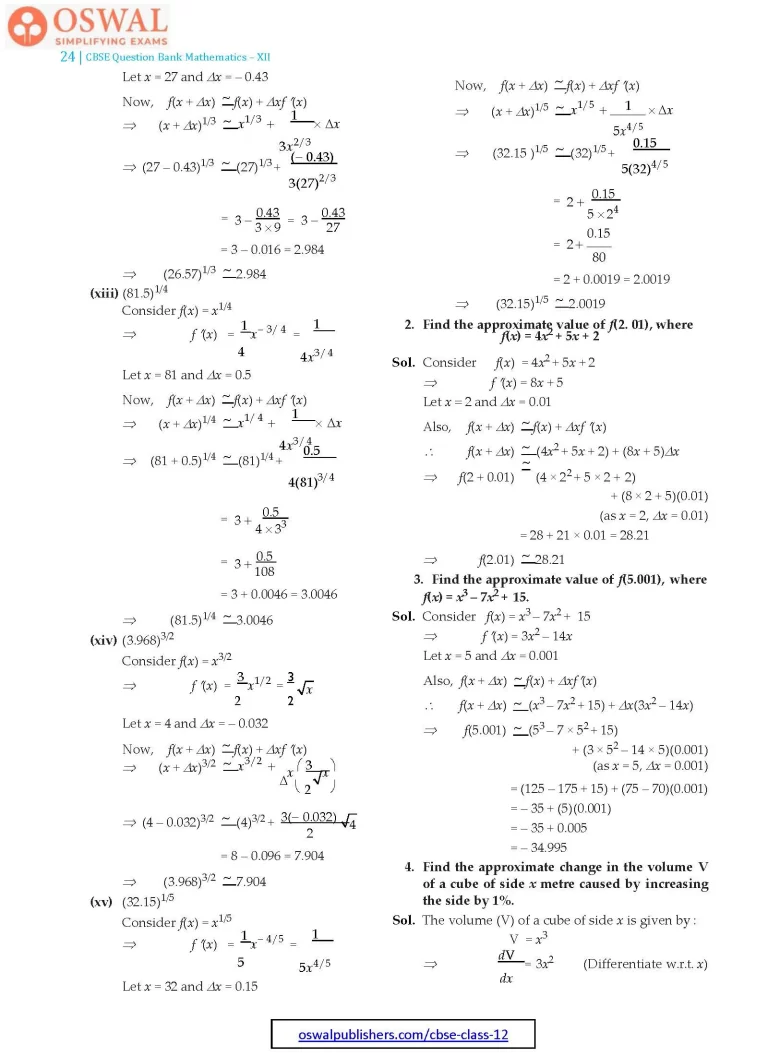
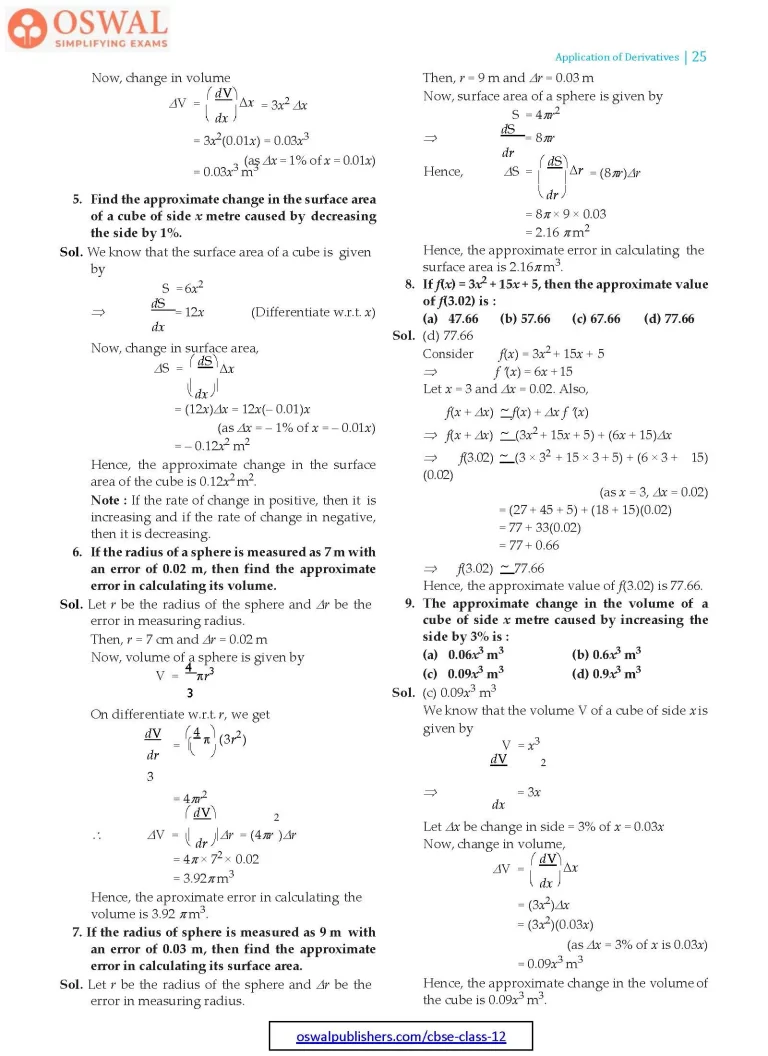
Access Exercises of Class 12 Maths Chapter 6 Application of Derivatives
Exercise 6.1 Solutions: 18 Questions (10 Long, 6 Short, 2 MCQs)
Exercise 6.2 Solutions: 19 Questions (10 Long, 7 Short, 2 MCQs)
Exercise 6.3 Solutions: 27 Questions (14 Long, 11 Short, 2 MCQs)
Exercise 6.4 Solutions: 9 Questions (7 Short, 2 MCQs)
Exercise 6.5 Solutions: 29 Questions (15 Long, 11 Short, 3 MCQs)
Miscellaneous Exercise Solutions: 24 Questions (14 Long, 4 Short, 6 MCQs)
Exercise 6.4
1. Using differentials, find the approximate value of each of the following upto 3 places of decimal
$$\textbf{(i)}\space\sqrt{\textbf{25.3}}\space\textbf{(ii)}\space\sqrt{\textbf{49.5}}\space\textbf{(iii)}\sqrt{\textbf{0.6}}$$
(iv) (0.009)1/3 (v) (0.999)1/10 (vi) (15)1/4
(vii) (26)1/3 (viii) (255)1/4 (ix) (82)1/4
(x) (401)1/2 (xi) (0.0037)1/2 (xii) (26.57)1/3
(xiii) (81.5)1/4 (xiv) (3.968)3/2 (xv) (32.15)1/5
$$\textbf{Sol.}\space\text{(i)}\space\sqrt{25.3}\\\text{Consider f(x) =}\sqrt{x}.\space\\\text{Let x = 25 and} \Delta \text{x = 0.3}\\f'(x)=\frac{1}{2\sqrt{x}}\\\text{Now , f(x +} \Delta \text{x)} \simeq \text{f(x) + }\Delta \text{x f} '\text{(x)}\\\Rarr\space\sqrt{x+\Delta x}=\sqrt{x}+\frac{1}{2\sqrt{x}}×\Delta x\\\Rarr\space\sqrt{25.3}\simeq\sqrt{25}+\frac{0.3}{2\sqrt{25}}\\=\space 5 + \frac{0.3}{10}=5.03\\\Rarr\space \sqrt{25.3}\simeq 5.03$$
Note : The approximate value is not equal to the exact value.
$$\textbf{(ii)}\space\sqrt{49.5}\\\text{Consider f(x) =}\sqrt{x}\\\Rarr\space f'(x)=\frac{1}{2\sqrt{x}}$$
Let x = 49 and Δx = 0.5
$$\text{Now, f(x +} \Delta x)\simeq\space\text{f(x) +}\Delta x \space f'(x)\\\therefore\space \sqrt{x+\Delta x}\simeq\sqrt{x}+\frac{1}{2\sqrt{x}}×\Delta x\\\Rarr\space \sqrt{49.5}\simeq\sqrt{49}+\frac{0.5}{2\sqrt{49}}\\=7+\frac{05}{140}=7+0.036\\\Rarr\space \sqrt{49.5}\simeq 7.036$$
$$\textbf{(iii)}\space \sqrt{0.6}\\\text{Consider f(x) =}\sqrt{x}\\\Rarr\space f'(x)=\frac{1}{2\sqrt{x}}$$
Let x = 0.64 and Δx = – 0.04
$$\text{Now , f(x + Δx)} \simeq \text{f(x) + Δx f} '\text{(x)}$$
$$\Rarr\space \sqrt{x+\Delta x}\space\simeq\space\sqrt{x}+\frac{1}{2\sqrt{x}}×\Delta x\\\Rarr\space \sqrt{0.64-0.04}\simeq\sqrt{0.64}+\frac{(-0.04)}{2\sqrt{0.64}}\\=0.8-\frac{0.04}{2×0.8}$$
= 0.8 – 0.025 = 0.775
$$\Rarr\space \sqrt{0.6}\simeq0.775$$
(iv) (0.009)1/3
Consider f(x) = x1/3
$$\Rarr\space f'(x)=\frac{1}{3}x^{\normalsize -2/3}$$
Let x = 0.008 and Δx = 0.001
$$\text{Now, f(x +} \Delta \text{x)}\simeq\text{f(x) +} \Delta x f'(x)\\\Rarr\space (x+\Delta x)^{1/3}\simeq x^{1/3}+\frac{1}{3x^{2/3}}×\Delta x$$
⇒ (0.008 + 0.001)1/3
$$\simeq\space(0.008)^{1/3}+\frac{0.001}{3(0.008)^{2/3}}\\=0.2+\frac{0.001}{3[(0.2)^3]^{2/3}}\\=0.2+\frac{0.001}{3×(0.2)^2}\simeq 0.208$$
⇒ (0.009)1/3 ~ 0.208
(v) (0.999)1/10
Consider f(x) = x1/10. Let x = 1 and Δx = – 0.001
$$f'(x)=\frac{1}{10}x^{\normalsize -9/10}$$
$$\text{Now, f(x +} \Delta x)\simeq\text{f(x) +} \Delta x f'(x)\\\Rarr\space (x+\Delta x)^{1/10}\simeq x^{1/10}+\frac{1}{10x^{9/10}}×\Delta x\\\Rarr\space (1- 0.001)^{1/10}\simeq(1)^{1/10}+\frac{(-0.001)}{10(1)^{9/10}}\\=1-\frac{0.001}{10×1}$$
= 1 – 0.0001
= 0.9999
∴ (0.999)1/10 ~ 0.9999
(vi) (15)1/4
Consider f(x) = x1/4
$$\Rarr\space f'(x)=\frac{1}{4}x^{\normalsize -3/4}$$
Let x = 16 and Δx = – 1
Now, f(x + Δx) ~ f(x) + Δx f ′(x)
$$\Rarr\space (x+\Delta x)^{1/4}\simeq x^{1/4} + \frac{\Delta x}{4x^{3/4}}\\\Rarr\space (16-1)^{1/4}\simeq(16)^{1/4}+\frac{(-1)}{4(16)^{3/4}}\\=2-\frac{1}{4\lbrack[(16)^{1/4}\rbrack^{3}}\\=2-\frac{1}{4×2^{3}}$$
= 2 – 0.031 = 1.969
∴ (15)1/4 ~ 1.969
(vii) (26)1/3
Let f(x) = x1/3
$$\Rarr\space f'(x)=\frac{1}{3}x^{-2/3}$$
Let x = 27 and Δ x = – 1,
Now, f(x + Δx) ~ f(x) + Δx f ′(x)
$$\Rarr\space (x+\Delta x)^{1/3}\simeq x^{1/3}+\frac{\Delta x}{3x^{2/3}}\\\Rarr\space (27-1)^{1/3}\simeq(27)^{1/3}+\frac{(-1)}{3(27)^{2/3}}\\=3-\frac{1}{3[(27)^{1/3}]^2}\\=3-\frac{1}{3×3^2}$$
= 3 – 0.037 = 2.963
$$\Rarr\space (26)^{1/3}\simeq 2.963$$
(viii) (255)1/4
Consider f(x) = x1/4
$$\Rarr\space f'(x)=\frac{1}{4x^{3/4}}$$
Let x = 256 and Δx = – 1,
$$f'(x)=\frac{1}{4}x^{\normalsize -3/4}$$
$$\text{Now, f(x +} \Delta x)\simeq f(x)+\Delta xf'(x)\\\Rarr\space(x + \Delta x )^{1/4}\simeq x^{1/4}+\frac{\Delta x}{4x^{3/4}}\\\Rarr\space (256-1)^{1/4}\simeq (256)^{1/4} + \frac{(-1)}{4(256)^{3/4}}\\=4+\frac{-1}{4\lbrack(256)^{1/4}\rbrack^{3}}\\=4-\frac{1}{4×4^{3}}\\=4-\frac{1}{256}$$
= 4 – 0.004 = 3.996
$$\Rarr\space (255)^{1/4}\simeq 3.996$$
(ix) (82)1/4
Consider f(x) = x1/4
$$\Rarr\space f'(x)=\frac{1}{4}x^{-3/4}$$
Let x = 81 and Δx = 1
$$\text{Now , f(x +} \Delta x)\simeq f(x)+\Delta x f'(x)\\\Rarr\space (x+\Delta x)^{1/4}\simeq x^{1/4}+\frac{\Delta x}{4 x^{3/4}}\\\Rarr\space (81+1)^{1/4}\simeq (81)^{1/4}+\frac{1}{4(81)^{3/4}}\\3+\frac{1}{4\lbrack(81)^{1/4}\rbrack^{3}}\\=3+\frac{1}{4×3^3}\\=3+\frac{1}{108}$$
= 3 + 0.009 = 3.009
$$\Rarr\space (81)^{1/4}\simeq\space 3.009$$
(x) (401)1/2
$$\text{Consider f(x) =}\sqrt{x}\\\Rarr\space f'(x)=\frac{1}{2\sqrt{x}}$$
Let x = 400 and Δx = 1
$$\text{Now , f(x +} \Delta x)\simeq\text{f(x)+}\Delta x f'(x)\\\Rarr\space \sqrt{x+\Delta x}\simeq \sqrt{x} + \frac{1}{2\sqrt{x}}×\Delta x\\\Rarr\space \sqrt{400+1}\simeq\sqrt{400}+\frac{1}{2\sqrt{400}}\\=20+\frac{1}{2×20}$$
= 20 + 0.025 = 20.025
$$\Rarr\space\sqrt{401}\simeq 20.025$$
(xi) (0.0037)1/2
$$\text{Consider f(x) =}\sqrt{x}\\\Rarr\space f'(x)=\frac{1}{2\sqrt{x}}$$
Let x = 0.0036 and Δ x = 0.0001
Now , f(x + Δx) ~ f(x) + Δ xf ′(x)
$$\Rarr\space \sqrt{x+\Delta x}\simeq\sqrt{x}+\frac{1}{2\sqrt{x}}×\Delta x\\\Rarr\space \sqrt{0.0036+0.0001}\\=\sqrt{0.0036}+\frac{0.0001}{2\sqrt{0.0036}}\\=0.06+\frac{0.0001}{2×0.06}$$
= 0.06 + 0.0008 = 0.0608
$$\Rarr\space\sqrt{0.0037}\simeq
0.0608$$
(xii) (26.57)1/3
Consider f(x) = x1/3
$$\Rarr\space f'(x)=\frac{1}{3}x^{-2/3}=\frac{1}{3x^{2/3}}$$
Let x = 27 and Δx = – 0.43
$$\text{Now,}\space f(x+\Delta x )\simeq f(x)+\Delta xf'(x)\\\Rarr\space (x+\Delta x)^{1/3}\simeq x^{1/3}+\frac{1}{3x^{2/3}}×\Delta x\\\Rarr\space (27-0.43)^{1/3}=(27)^{1/3}+\frac{(-0.43)}{3(27)^{2/3}}\\=3-\frac{0.43}{3×9}\\=3-\frac{0.43}{27}$$
= 3 – 0.016 = 2.984
$$\Rarr\space (26.57)^{1/3}\simeq 2.984$$
(xiii) (81.5)1/4
Consider f(x) = x1/4
$$\Rarr\space f'(x)=\frac{1}{4}x^{\normalsize -3/4}\\=\frac{1}{4x^{3/4}}$$
Let x = 81 and Δx = 0.5
$$\text{Now,}\space f(x+\Delta x)\simeq\space f(x)+\Delta f'(x)$$
$$\Rarr\space (x+\Delta x)^{1/4}\simeq x^{1/4}+\frac{1}{4x^{3/4}}×\Delta x\\\Rarr\space (81+0.5)^{1/4}\simeq(81)^{1/4}+\frac{0.5}{4(81)^{3/4}}\\=3+\frac{0.5}{4×3^3}\\=3+\frac{0.5}{108}$$
= 3 + 0.0046 = 3.0046
$$\Rarr\space (81.5)^{1/4}\simeq 3.0046$$
(xiv) (3.968)3/2
Consider f(x) = x3/2
$$\Rarr\space f'(x)=\frac{3}{2}x^{1/2}=\frac{3}{2}\sqrt{x}$$
Let x = 4 and Δx = – 0.032
$$\text{Now,\space f(x +}\Delta x)\simeq f(x)+\Delta x f'(x)\\\Rarr\space(x+\Delta x)^{3/2}\simeq x^{3/2} + \Delta x\bigg(\frac{3}{2}\sqrt{x}\bigg)\\\Rarr\space (4-0.032)^{3/2}\simeq (4)^{3/2} + \frac{3(-0.032)}{2}\sqrt{4}$$
= 8 – 0.096 = 7.904
$$⇒ (3.968)^{3/2} \simeq 7.904$$
(xv) (32.15)1/5
Consider f(x) = x1/5
$$\Rarr\space f' (x)=\frac{1}{5}x^{-4/5}=\frac{1}{5x^{4/5}}$$
Let x = 32 and Δx = 0.15
Now , f(x + Δx) ~ f(x) + Δxf ′(x)
$$\text{Now , f(x +}\Delta x)\simeq f(x) + \Delta x f'(x)\\\Rarr\space (x + \Delta x)^{1/5}\simeq x^{1/5} + \frac{1}{5x^{4/5}}×\Delta x\\\Rarr\space (32.15)^{1/5}\simeq (32)^{1/5} + \frac{0.15}{5(32)^{4/5}}\\= 2+\frac{0.15}{5×2^4}\\=2 +\frac{0.15}{80}$$
= 2 + 0.0019 = 2.0019
$$\Rarr\space (32.15)^{1/5}\simeq 2.0019$$
2. Find the approximate value of f(2. 01), where
f(x) = 4x2 + 5x + 2
Sol. Consider f(x) = 4x2 + 5x + 2
⇒ f ′(x) = 8x + 5
Let x = 2 and Δx = 0.01
$$\text{Also,}\space f(x+\Delta x)\simeq\space\text{f(x) + }\Delta xf ′(x)\\\therefore\space f(x+\Delta x)\simeq(4x^2+5x+2)+(8x+5)\Delta x\\\Rarr\space f(2+0.01)\simeq(4×2^{2}+5×2+2)+\\(8×2+5)(0.01)\\\text{(as x=2,}\space \Delta x=0.01)$$
= 28 + 21 × 0.01 = 28.21
$$\Rarr\space f(2.01)\simeq 28.21$$
3. Find the approximate value of f(5.001), where f(x) = x3 – 7x2 + 15.
Sol. Consider f(x) = x3 – 7x2 + 15
⇒ f ′(x) = 3x2 – 14x
Let x = 5 and Δx = 0.001
$$\text{Also, f(x +} \Delta x)\simeq\text{f(x)+}\Delta xf'(x)\\\therefore\space f(x+\Delta x)\simeq( x^3-7x^2+15)+\Delta x(3x^2-14 x)\\\Rarr\space f(5.001)\simeq (5^3-7×5^2+15)+\\(3×5^2-14×5)(0.001)\\\text{(as x=5,} \Delta x =0.001)$$
= (125 – 175 + 15) + (75 – 70)(0.001)
= – 35 + (5)(0.001)
= – 35 + 0.005
= – 34.995
4. Find the approximate change in the volume V of a cube of side x metre caused by increasing the side by 1%.
Sol. The volume (V) of a cube of side x is given by :
V = x3
$$\Rarr\space \frac{dV}{dx}=3x^2\space \text{(Differentiate w.r.t. x)}\\\text{Now, change in volume}\\\Delta V=\bigg(\frac{dV}{dx}\bigg)\space\Delta x=3x^2\Delta x$$
= 3x2(0.01x) = 0.03x3
(as Δx = 1% of x = 0.01x)
= 0.03x3 m3
5. Find the approximate change in the surface area of a cube of side x metre caused by decreasing the side by 1%.
Sol. We know that the surface area of a cube is given by
S = 6x2
$$\Rarr\space \frac{\text{dS}}{dx}=12 x\space\text{(Differentiate w.r.t. x)}\\\text{Now , change in surface area,}\\\Delta S=\bigg(\frac{dS}{dx}\bigg)\Delta x$$
= (12x)Δx = 12x(– 0.01)x
(as Δx = – 1% of x = – 0.01x)
= – 0.12x2 m2
Hence, the approximate change in the surface area of the cube is 0.12x2 m2.
Note : If the rate of change in positive, then it is increasing and if the rate of change in negative, then it is decreasing.
6. If the radius of a sphere is measured as 7 m with an error of 0.02 m, then find the approximate error in calculating its volume.
Sol. Let r be the radius of the sphere and Dr be the error in measuring radius.
Then, r = 7 cm and Δr = 0.02 m
Now , volume of a sphere is given by
$$\text{V}=\frac{4}{3}\pi r^3$$
On differentiate w.r.t. r, we get
$$\frac{dV}{dr}=\bigg(\frac{4}{3}\pi\bigg)(3r^2)\\=4\pi r^2\\\therefore\space\Delta V=\bigg(\frac{dV}{dr}\bigg)\Delta r=(4\pi r^2)\Delta r$$
= 4π× 72 × 0.02
= 3.92p m3
Hence, the aproximate error in calculating the volume is 3.92 π m3.
7. If the radius of sphere is measured as 9 m with an error of 0.03 m, then find the approximate error in calculating its surface area.
Sol. Let r be the radius of the sphere and Dr be the error in measuring radius.
Then, r = 9 m and Δr = 0.03 m
Now , surface area of a sphere is given by
S = 4πr2
$$\Rarr\space\frac{dS}{dr}=8\pi r\\\text{Hence,\space}\Delta S=\bigg(\frac{dS}{dr}\bigg)\Delta r=(8\pi r)\Delta r$$
= 8π × 9 × 0.03
= 2.16 π m2
Hence, the approximate error in calculating the surface area is 2.16p m3.
8. If f(x) = 3x2 + 15x + 5, then the approximate value of f(3.02) is :
(a) 47.66 (b) 57.66 (c) 67.66 (d) 77.66
Sol. (d) 77.66
Consider f(x) = 3x2 + 15x + 5
⇒ f ′(x) = 6x + 15
Let x = 3 and Δx = 0.02. Also,
$$f(x+\Delta x)\simeq f(x)+\Delta x f'(x)\\\Rarr\space f(x+\Delta x) \simeq(3x^2+15x+5)+(6x+15)\Delta x\\\Rarr\space f(3.02)\simeq(3×3^2+15×3+5)\\+(6×3+15)(0.02)$$
(as x = 3, Dx = 0.02)
= (27 + 45 + 5) + (18 + 15)(0.02)
= 77 + 33(0.02)
= 77 + 0.66
$$\Rarr\space f\text{(3.02)}\simeq 77.66$$
Hence, the approximate value of f(3.02) is 77.66.
9. The approximate change in the volume of a cube of side x metre caused by increasing the side by 3% is :
(a) 0.06x3 m3 (b) 0.6x3 m3
(c) 0.09x3 m3 (d) 0.9x3 m3
Sol. (c) 0.09x3 m3
We know that the volume V of a cube of side x is given by
V = x3
$$\Rarr\space \frac{dV}{dx}=3x^2$$
Let Δx be change in side = 3% of x = 0.03x
Now , change in volume,
$$\Delta V=\bigg(\frac{dV}{dx}\bigg)\Delta x$$
= (3x2)Δx
= (3x2)(0.03x)
(as Δx = 3% of x is 0.03x)
= 0.09x3 m3
Hence, the approximate change in the volume of the cube is 0.09x3 m3.
